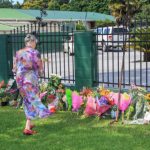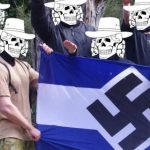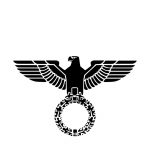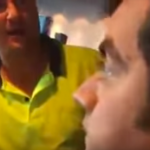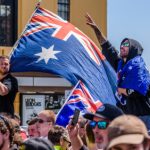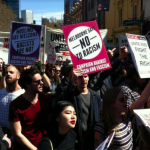Exposing the Far-Right in Australia: An Interview With the White Rose Society
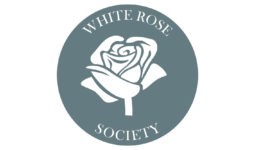
The White Rose Society is a clandestine group of online anti-fascists operating in Australia. It has the aim of exposing the rising white nationalist movement in this country in all its various forms: from street-level movements to politicking at the highest level.
Having worked in different anti-fascist and anti-racist spaces in the past, the anonymous activists formed the society as they saw the need for an organised response to the far-right, which, they make clear, is a much more serious threat than the majority of Australians understand it to be.
The society is conducting long-term investigative research into not just the operations of the right-wing nationalist groups – like The Lads Society or the Antipodean Resistance – but they’re also keeping an eye on politicians and academics who are pushing the ethno-nationalist agenda.
Right in the Canberra bubble
The Guardian ran a story last Sunday about north Queensland MP Bob Katter pledging allegiance to US far-right group the Proud Boys. When the publication asked Katter about how he came to be hanging out with extreme white nationalists, he put it down to his “irresponsible larrikinism”.
But, the White Rose Society doesn’t believe that a federal politician taking a vow of loyalty to a racist hate group can be put down to simple tomfoolery. And that’s why it handed over the September 2017 footage depicting Katter doing just that to the media.
The online anti-fascist group has also been keeping its eye on another politician: Fraser Anning, who’s the short-lived senator that actually referenced the Third Reich in his “final solution” maiden speech in parliament. And last January, the society revealed on its blog that this was no accident.
The descendant of Queensland colonisers, who violently took over Gudjal country, Anning stood side by side with neo-Nazis at the Reclaim St Kilda rally that same month. And there’s even a photo circulating online of Anning shaking hands with white nationalist poster boy Blair Cottrell.
Infiltrating political parties
The ABC’s Background Briefing revealed last October that in May last year, 5 white nationalists, who were part of a group called the New Guard, covertly joined the Young Nationals with the intention of swaying the party’s policies further right.
The White Rose Society formed part of the investigation. Its members were able to provide inside information on some of the nationalists, as online they’re able to monitor far-right activity on social media platforms using fake profiles.
Following the release of the ABC story, NSW Greens MLC David Shoebridge moved a motion rejecting “the entry of alt-right political groups, and their race-baiting language, into mainstream Australian politics”. And he also praised the White Rose Society for helping expose the infiltration.
Sydney Criminal Lawyers spoke to a White Rose Society spokesperson about how the support for far-right groups is one the rise, the extent to which white nationalists have infiltrated mainstream politics, and how far-righters in parliament are helping to swing moderates further right.
Firstly, a recent article in the Guardian about Bob Katter taking the Proud Boys pledge was based on footage the White Rose Society passed on to the publication. Why did your organisation want to expose this incident?
The Proud Boys in Australia are not as visible or as violent as they are in the US. They do have an extensive membership though. Australia-wide, they’ve got close to 200 members.
In terms of Bob Katter, we really wanted to highlight that he has a long history of far-right politics and that his values align closely with far-right groups, like the Proud Boys.
Bob Katter is often treated like a living meme. He says something stupid, it goes viral and people have a laugh. Whereas he has a long history of supporting ethno-nationalism, anti-abortion politics and eugenics. And he has very explicit migration policies closely in line with the White Australia policy.
We thought it was worth highlighting that Fraser Anning didn’t just come from nowhere. He came from the Hanson party, but then went on to Katter. And it was only following his final solution speech that Katter was embarrassed and denounced him.
Anning’s and Katter’s politics are quite similar. They both run on explicitly nationalist and protectionist platforms. And there’s lots of rhetoric that they have around immigration that’s really quite racist.
Katter was with some Australian members of the Proud Boys. But, more so these days, when local patriot groups are featured in the press, we hear about Blair Cottrell’s The Lads Club, along with the Antipodean Resistance.
These white nationalist groups don’t seem to have such a visible on-the-street profile as earlier groups did, such as Reclaim Australia and the United Patriots Front.
Has there been a drop in the support of these fascist-leaning groups of late? Or is something else going on?
There hasn’t been a drop at all. In fact, there’s actually been an increase in support.
A large amount of the population – who may not have been involved with Reclaim Australia or even considered these views – have now been radicalised to the right: whether they’re just commenting online and not a member of any organised group, or whether they’ve joined one.
We still live in a colonial country, with both major parties upholding and promoting racist views and policies, such as the Fortress Australia, with refugees being held for up to six years in offshore concentration camps.
So, we can’t solely blame actors on the far-right who aren’t involved in politics for the radicalisation of the voter base, when a lot of this appears in parliament.
An example is the conspiracy theory around South African white farmer genocide, which, we believe, has been pushed by the Suidlanders through politicians like Anning and Andrew Laming.
In terms of the nationalist not being visible on the street, there was one major exception, which was St Kilda in January. Obviously, Anning appeared there and was photographed with a number of Nazis.
And there have been some very large mobilisations. There was a march for South Africa early last year in response to the white South African farmers conspiracy theory. That was probably over 2,000 people, which was large for Brisbane.
Brisbane also saw around 4,000 people for March for Life, which was an anti-abortion rally for pro-life Christians and christo-fascists. That was around the time the Queensland abortion laws changed to legalise abortions and protect patients at medical clinics.
So, they are mobilising, just in different ways. There was also a True Blue Crew barbecue prior to the election, where there was a candidate from almost every micro party represented. There was one from the Katter party, Anning’s party, Pauline Hanson’s candidate and The Great Australian party.
These groups are not as public, as their goals are different now. Particularly, for groups like the Lads Society. They’re working on an alternative society, which historically in the Nazi movement has been called Pioneer Little Europe.
It’s where they try to set up an alternative to the mainstream: a whites-only community. They start with these little club houses. Then they get each other jobs. Their aim is to buy property, where all the whites live and home school their children.
They want to set up an alternate economy that’s protected. It’s very traditionalist. We’re not sure that they’ll succeed with this here. But, they’re certainly pushing. And the start is these clubhouses, like The Lads Society.
The White Rose Society revealed in January that there was more to Anning’s rhetoric – including in the “final solution” speech – than just some racist spouting off. Could you tell us a little about what was behind Anning’s brief notoriety?
Fraser Anning definitely agrees with the views of neo-Nazis. He’s been a convenient opportunity for a number of them, who have organised and infiltrated over the last 10 to 20 years to push far-right politics into the mainstream. Before that they tried Clive Palmer.
They use a number of tools, especially social media. They’ve used memetic warfare – meme warfare – to push far-right politics in coded language out to the population through social media. And they’ve succeeded.
We watched people who weren’t radical before – or even openly racist – become radicalised solely through the memes on Anning’s page. And then through joining Anning’s supporter groups.
We watched people becoming more and more explicitly fascist – even if they didn’t know that was the term that could be used about them – simply through this online narrative.
Do you think we’ve seen the last of Anning?
We don’t think so. We definitely don’t think we’ve seen the last of the people who were working with him. He did get a significant amount of donations leading up to the federal election. And he’s an attention seeker, who wants the spotlight, and he’s committed to the cause.
So, we think he’ll find another opportunity. They said they’d be running state candidates.
His voter base wasn’t huge, thankfully, but there was quite a mobilisation around him. And these were people who were very invested in him as this figure of nationalism in Australia.
Last October, the ABC’s Background Briefing revealed that a group of 25 white nationalists had covertly joined the Young Nationals in May 2017 in an attempt to shape the party’s policies.
You’ve already touched on this, but in your understanding, how widespread is this attempt by the alt-right to infiltrate political parties?
They’re already in other parties, including the Liberals. We did see from the Young Nationals fallout that Jeffery McCormack, who was heavily implicated at the centre of it, was not disciplined. He’s now the chief of staff for the water minister Melinda Pavey.
So, they’re already there. They’re not going anywhere. And they’re already trying to infiltrate other parties. Largely, the narrative online is that they don’t believe in the main parties anymore, so they’d rather push the micro parties and get involved in them.
There was also a large number of people implicated in the Nationals infiltration that were never disciplined, as they were, unfortunately, unable to find enough information on them. So, they’re still in that party.
The White Rose Society was part of the investigation into the infiltration of the Young Nationals, as you’d been monitoring right-wing activity online using hidden identities. Just how large and radicalised would you say the white nationalist online movement is in this country?
It’s difficult to give an estimation of the number of people. But, it’s far larger than a lot of people realise or perhaps, want to know, because it’s a threat. People only need to look at the comments section on any major news site to see the level of racist and explicitly white nationalist sentiment.
We should recognise that the nation of Australia was founded on the White Australia policy. And we haven’t dealt with colonialism here. We are still an explicitly racist country in the mainstream.
And while from the outside these different groups may look fractured, we want to emphasise that the organised fascists have direct and intimate social and political connections to each other across Australia, within parliament and internationally.
Even if these Nazis aren’t on the street regularly at the moment there’s always a threat. One Brenton Tarrant is enough to prove that. That’s something some of us were warning about a decade ago.
There are dozens of Brenton Tarrants out there in Australia. And the security agencies, the state police and politicians aren’t taking that threat seriously enough.
Last October, all the Coalition senators briefly voted in favour of a Pauline Hanson motion declaring that “It’s OK to be white”, which is a well-known white nationalist slogan.
Do you think that having hard right politicians in parliament allows others that appear moderate to express more extreme views?
Most definitely. When Hanson was first elected, the Liberal party adopted her policies and speech in order to take back some of the voter base from her. And that was the beginning of pushing mainstream politics more publicly further to the right.
Having right-wing people in parliament from micro parties allows for the validation of those views. Politicians can back a motion like “it’s OK to be white” and then pretend they didn’t know what they were voting for. And there are people in the major parties who are explicitly Islamophobic and racist.
And lastly, Morrison credited his recent win to the “quiet Australians”, which the New York Times described as a similar “populist” group to those that voted for Donald Trump and Brexit.
In your opinion, was the recent election outcome a sign that the political climate in this country has significantly moved to the right?
We don’t attribute Morrison’s win to populism or the silent majority. There’s an issue with electoral politics and the breakdown of demographics, which is actually far more complex. People like to pick one group for an election result, particularly, if the result came as a shock.
There’s the Aussie battler trope, but we’ve got people battling from all backgrounds. There are immigrants and people on temporary visas battling. The battler is meant to be the hard done by white Australian. And that’s meant to be who voted for the Coalition. We don’t believe that’s true.
There was quite a lot of laziness in the media in reporting the results of the election. There was a lot of blame attributed to Queensland, which has been shown not to be true.
There are issues with our preferential voting system. And the number of micro parties that split the vote didn’t help. We did see the supporters of the micro parties – particularly with Anning – say that they were happy that at least the Liberals got in.
We think that the Liberals’ win is almost a default, because both Labor and the Liberals offer no vision for Australia as a country.
We’re currently a nation without any ambition or vision for who we want to be both nationally and internationally. There’s very little policy offering hope or economic equality.
We just simply double down on our Fortress Australia policies. And we are always ready to scapegoat the Other, whether it is Muslim immigrants or African gangs. And both parties do that.
It’s not just down to populism. It’s more complex than that. But, there’s most definitely a more conservative and right-wing voter base. And Scott Morrison is a right-wing Christian promoting right-wing Christian views.


